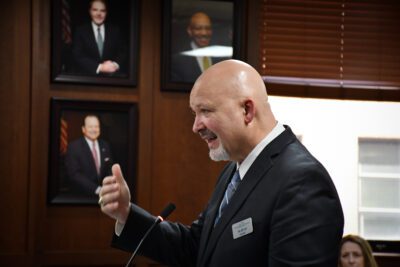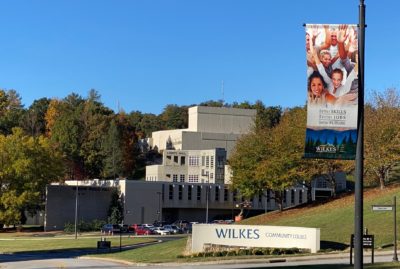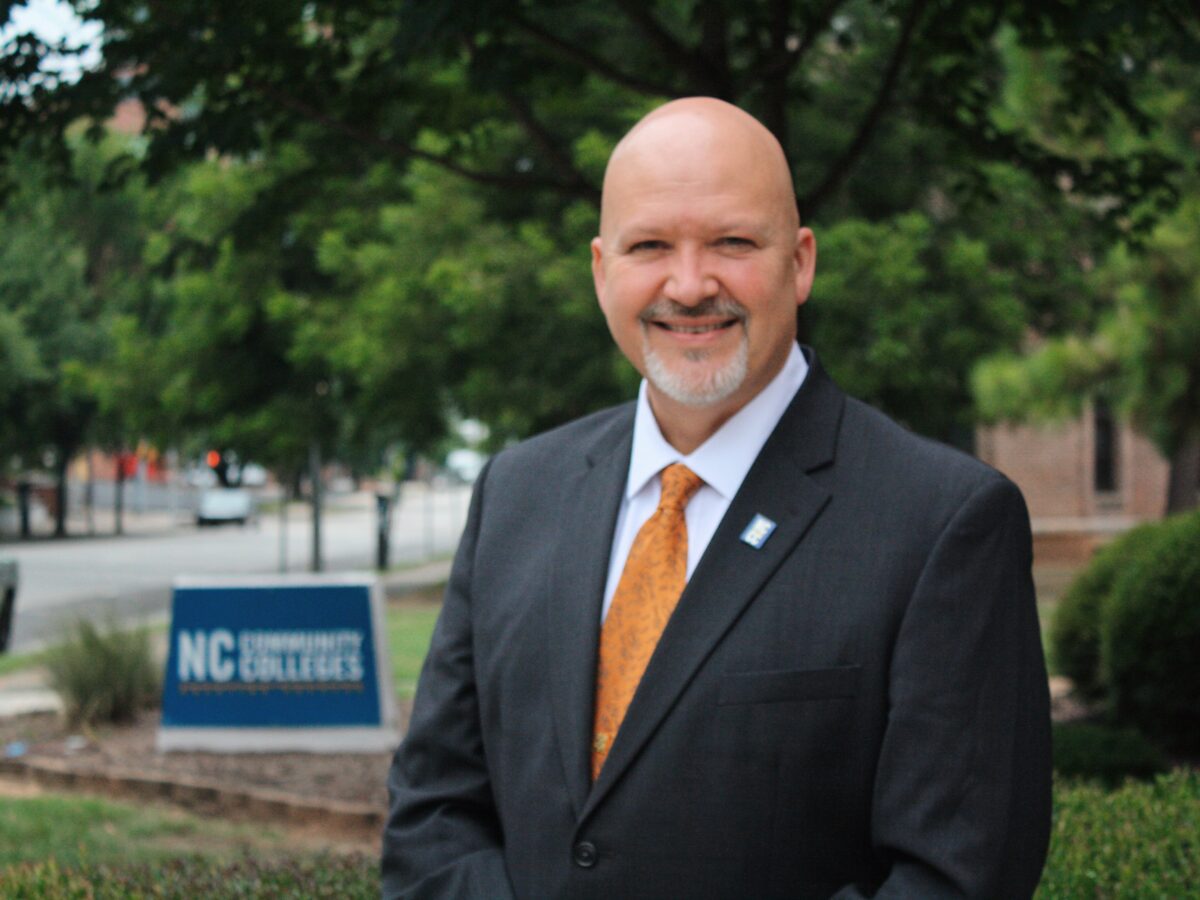
Share this story
- Dr. Jeff Cox, former president of Wilkes Community College, started as president of the N.C. Community College System on June 1. It's the latest step in a career that has spanned more than 30 years and much of the educational continuum.
- “You can sit back and fuss and fuss about the problems, or you can step up and see if you can be part of the solution,” Dr. Jeff Cox said about deciding to apply to become president of the N.C. Community College System.
|
|
Dr. Jeff Cox was named president of the N.C. Community College System (NCCCS) in April – marking the latest step in a career that has spanned more than 30 years and much of the educational continuum.
“I have spent my entire adult life in the education arena,” he told EdNC at the time, “from pre-K through the university level working to equip students with the skills, degrees, and credentials they need to improve their social and economic mobility.”
His vision is shaped, in part, by a career that has taken him from serving as an English teacher and football and golf coach to superintendent of Alleghany County Schools, president of Wilkes Community College, and now president of the community college system.
“You can sit back and fuss and fuss about the problems, or you can step up and see if you can be part of the solution,” Cox said.
On June 1, he officially took the helm of the NCCCS.
As North Carolina works to meet its educational attainment goal and workforce needs, Cox is focused on extending the workforce pipeline to the K-12 system, he told the Golden LEAF Foundation in a recent interview. He’s also focused on making the postsecondary education offered by community colleges more accessible to more students.
Such focuses are necessary to a growing state, Sen. President Pro Tempore Phil Berger, R-Guilford, said in a recent PBS Charlotte interview with Carolina Business Review.
EdNC recently had the chance to sit down with Cox to discuss such priorities, along with his accomplishments during his time as president of Wilkes Community College and goals for his time as system president.
For Cox, all of those things have one thing in common: always aiming to be part of the solution.
Get to know more of his journey to system president below.
Cox’s educational journey
Cox was born and raised in Sparta – part of Alleghany County in the northwest mountains of the state.
He grew up knowing he would one day attend college. Though neither of his parents completed college degrees – his father was a high school dropout – they instilled a value of education in him and his siblings from a very young age.
“(My mom) went in to work as a secretary at the local hospital, and over many years, worked her way up to being the CEO of the hospital,” Cox said. “They both wanted my brother and sister and me to go to college.”
At that time, Cox did not know that community colleges were an option.
“I wish I had,” he said. “I could have saved my parents a pile of money.”
Cox earned his bachelor’s degree from Appalachian State University and decided to be an educator due to the impact his teachers and coaches had on his life.
After a few years teaching, Cox pursued a principalship, motivated to do so by his desire to start a family and earn more money. He was also struck by the way principals affect their school’s culture – for better or for worse.
Cox earned his master’s in school education from Appalachian and moved to Union County with his then-new wife, Reba, where he worked as an assistant principal at Indian Trail Elementary School.
At that point, he thought he was done with school. Then the principal he worked for encouraged him to complete the doctorate of education program at UNC-Charlotte.
Three years later, while serving as principal of Benton Heights Year-Round School, Cox completed that program and moved to Lee County to work as an assistant superintendent.
Finally, the opportunity to go home arrived. In 2005, Cox moved back to Alleghany County, where he served as superintendent of the school system for nine years.
When the presidency at Wilkes Community College opened up, Cox was hesitant to apply, thinking the college would be looking for someone with community college experience. However, after encouragement from a former county commissioner, he started thinking more about the possibility.
“I thought this could be a great opportunity to do something new and challenging,” Cox said. “And really to make a bigger difference in our local community and to stay in the region.”
Despite his lack of community college experience, Cox said he understood the people and economic drivers of the area and thought he could improve the relationship between the K-12 and community college systems, especially around dual enrollment. He got the job and stayed at Wilkes Community College for nine years.
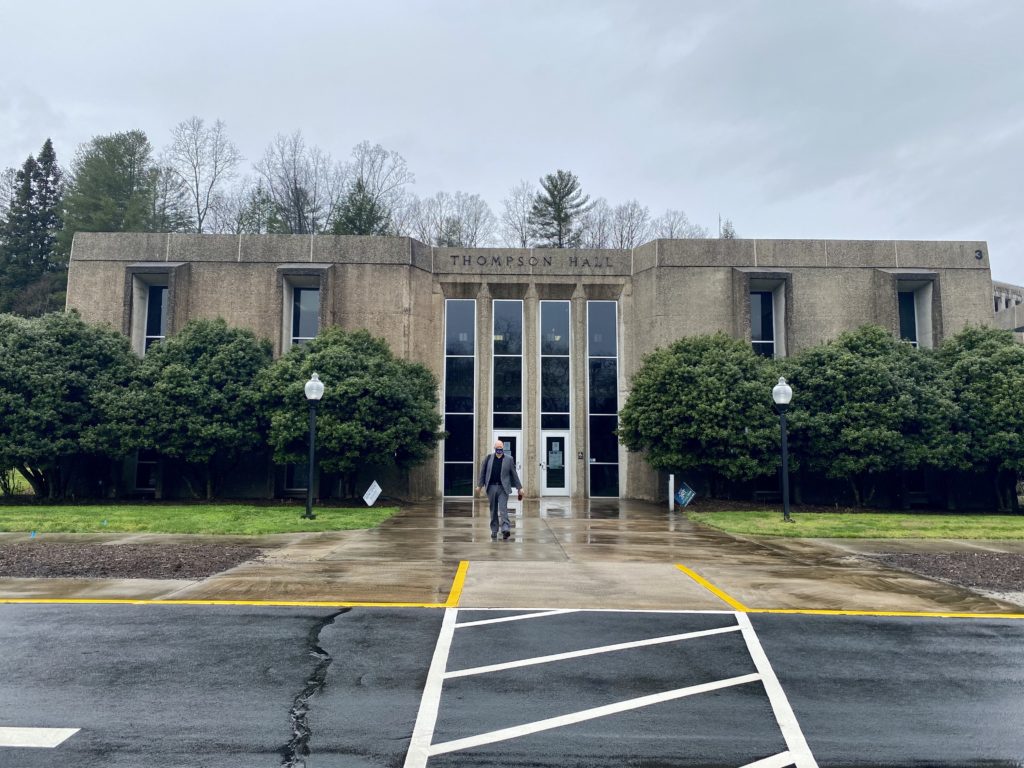
His time at Wilkes Community College
Early in his tenure at Wilkes Community College, Cox decided to focus on social mobility.
“We could see what was happening with our friends and neighbors and how many folks we had in our service area who were living in poverty,” he said. “We really thought that the key to remedying that is education – and that community colleges were in a really unique place.”
His team came across a report that showed that for people born in Wilkes Community College’s service area, roughly two out of three would stay poor.
When they looked at their own data, they saw that only about 25% of people who came to the college to get a two-year degree were successfully doing so in three years, statistics that are on par with national averages.
Many community college students – some of them low income, first-generation college-goers, or adult learners – experience financial, transportation, and child care challenges that make staying in college and completing their programs more difficult.
It’s a widespread phenomenon in national higher education, but one Cox and his team were determined to change in their community.
“If education is the key to a better life and a better career, better wages, and three out of four people who are attending our institution are not crossing the finish line, we’ve got to fix that,” Cox said.
In response, his team launched a five-year strategic plan with the goal of doubling the college’s graduation and transfer rate to 50%.
As of last year, that rate had increased to more than 55%. The college added and updated many of its supports, including tutoring, wraparound services, and emergency aid for students to help them stay in college.
“I’m really, really proud of the accomplishment, yes, but even more proud of all the faculty and staff rallying around together to put all the right pieces in place that enabled that to happen,” Cox said. “Because what we found was it wasn’t one silver bullet…it was dozens of different things that we did simultaneously.”
Cox also led MerleFest forward during his tenure — and through the pandemic. MerleFest, an internationally recognized music festival and fundraiser for the college, generates an economic impact north of $12 million each year.


In addition to increasing support for their students, the college also decided to focus on attracting more jobs to their region that paid a living wage.
“We thought if we were gonna be asking students to stay the course and finish and complete, we needed to have something on the other end that they can go into,” Cox said.
Out of that premise, NC Tech Paths was born. A strategic partnership between the Leonard G. Herring Family Foundation and Wilkes Community College, NC Tech Paths is a standalone nonprofit that helps the college recruit students into information technology (IT) programs. The nonprofit then works to place students in high-paying IT jobs where they can work remotely and live in the region.
Cox said the college received pushback when it began pitching the idea in February 2020, but during the pandemic, more and more companies became open to the idea of hiring full-time remote employees.
As of last year, more than 82% of graduates in the program had successfully been placed in remote jobs, according to a 2022 impact report. Of those graduates, they saw an average 70% increase in household income.
As system president, Cox hopes to scale up such success stories – for community colleges across the state to serve as “direct connectors” between students and jobs.
“You’ve got a job, we’ve got a student, student meet job and company meet student – that equation works,” he said. “With all 58 colleges across the state, we need to make sure any business or industry or job that pays a living wage, we need to be their partner and make sure they’ve got the talent pipeline.”
‘The future’s bright’
On April 21, Cox was officially named the 11th president of the NCCCS – also the eighth in eight years.
Though it was a difficult decision to apply, it also felt like the right time.
In addition to wanting less turnover for the system, the youngest of his three sons was graduating.
“So there wasn’t really anything holding me back from being able to consider this opportunity,” he said. “I really felt like with all the change and turnover we’d had at the system, we really needed a local president to step up and step into the role this time.”
A survey during the search process indicated at least 67% of presidents wanted a community college president to be selected as the new system leader.
“We are excited to see Jeff Cox take the helm of the North Carolina Community College System,” MC Belk Pilon, president and board chair of the John M. Belk Endowment, previously told EdNC. “From the beginning of our work with the great 58, Jeff has impressed our team with his leadership, focus on student success, and drive to improve outcomes for all of the residents of his service area.”
Since he started on June 1, he has worked hard to build his leadership team.
John Loyack, the former vice president of Global Business Services with the Economic Development Partnership of North Carolina (EDPNC), is the new system vice president of economic development, and Dr. Phillip Price, the former executive vice president and chief financial officer at Central Carolina Community College, is the new system Chief Financial Officer.
And last month, the system announced McDowell Technical Community College President Dr. Brian Merritt as senior vice president and chief academic officer of programs and student services.
“I’m big on collaboration and leading in that way, so having a really strong team, of very bright and capable people who have their hearts in the right place for this work meant a lot,” Cox said. “I’m really, really excited about the team we’ve built and think the future’s bright with that great team.”
‘I hope they’ll say I made a difference’
In the months ahead, Cox is focused on working toward the goals set for him last month by the State Board.
Some of those goals for his first year are listed below. You can view the full list of goals at this link.
- Develop an updated viable funding model.
- Scale system capacity and responsiveness to address workforce development needs.
- Develop a viable sustainability plan for rural colleges.
- Build a senior management team.
- Engage crucial constituencies.
- Oversee the development and execution of a comprehensive, statewide, and national communications, marketing, and branding plan.
Success for those goals will be determined, in part, by the system’s legislative success. This year, the system requested $232 million in additional funding over the biennium to support employee raises and student investment.
Since starting the job, Cox said he has met with multiple legislative leaders, including Gov. Roy Cooper and Sen. Berger.
“We need to continue to push hard for having all of our faculty and staff salaries to be more competitive. They all need and deserve more money,” Cox said. “But I do think there are also some economic realities, where we’re going to have some differentiated pay for these harder-to-fill areas.”
Cox will advocate for updating the system’s funding formula to enable community colleges to be more innovative and proactive in their programs.
Legislators, state leaders, and community college stakeholders alike want the NCCCS to “be the most innovative kind of forward-thinking community college system in the country,” Cox said.
“If we’re going to do that, and be ready to be agile and work at the speed of business and meet business and industry where they are and be able to launch programs quickly and effectively and efficiently, that takes resources,” he said. “We need to think about that in the funding formula, to think about to what extent we need additional funds to start up new programs.”
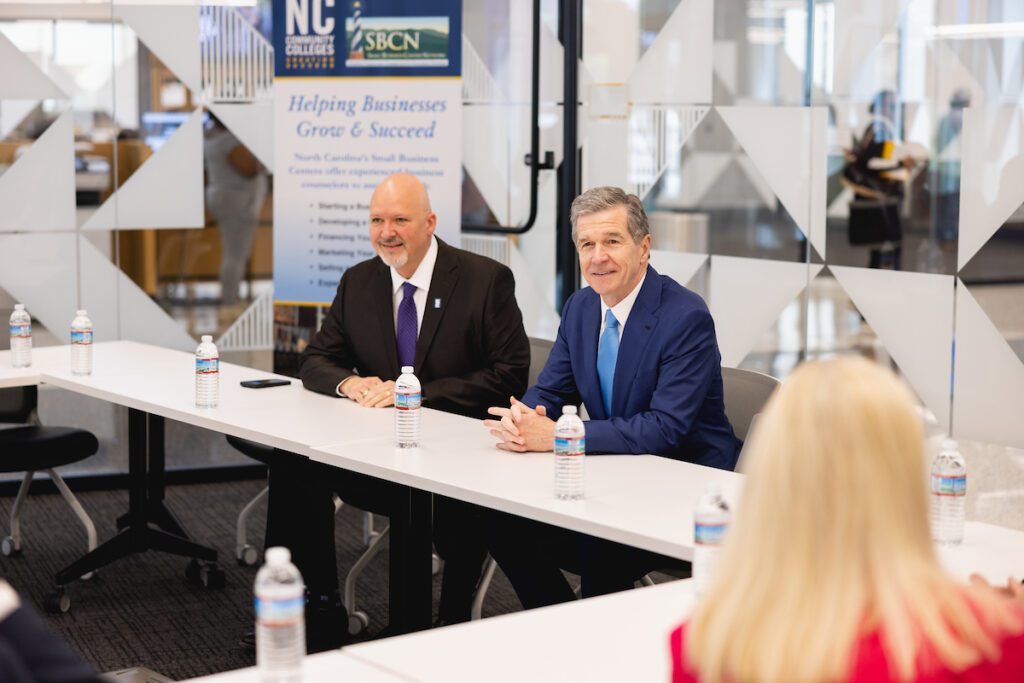
Cox is also focused on increasing and incentivizing regional collaboration between colleges. He wants to document and showcase existing collaborations while advocating for funding models that incentivize more partnerships.
He hopes to see more collaboration and resource sharing with rural community colleges. These colleges don’t have the same resources, both in what they get from the state and their own communities, Cox said, as the larger, more urban colleges.
“For North Carolina to truly prosper and be all it can be, we have to figure out how to better support the rural parts of the state,” he said.
Cox is also focused on expanding customized training and apprenticeship programs, student outcomes data, and K-12 partnerships and articulation agreements. In particular, he wants community colleges to reach more students, starting in middle school.
“I think I’d be wasting an opportunity if I didn’t use some of my background and experience to try to streamline things further along the education continuum,” Cox said.
With ambitious goals for the system and the state, he wants to explore potential philanthropic and business partnerships and build deeper relationships with the General Assembly.
Needless to say, Cox has a lot of goals for the job ahead of him.
His greatest hope for how people will one day remember his tenure as system president?
“I hope they’ll say I made a difference,” he said.
Forefront in his mind, as always, is the importance of social mobility – and the role he believes community colleges can play in expanding such mobility across North Carolina.
“I’d love to say we made a significant difference on reversing poverty – to reverse that statistic and say, if you’re born poor, there’s a two out of three chance in North Carolina that you’re going to get out of poverty,” Cox said. “And a lot of that is because of the community colleges. I think I could live with that legacy.”




